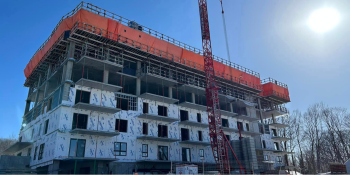Q&A Forums
Spray Foam Directly on Metal building/Barndominium Post New Topic | Post Reply
| Author | Comments |
|---|---|
|
will rutledge
Posted: Apr 18, 2014 01:09 PM
|
Spray Foam Directly on Metal building/Barndominium
I have a 30x60 metal building/barndominium in the San Antonio Tx area. It has red iron main frame with all 2x6 wood framing 16" on center on walls in between I-beams and 8" steel purlin on roof. Siding and roof are tin sheets. It is going to be a residential home inside.My plan was to have spray foam sprayed directly on the tin sheets. Drywall would then be applied on interior walls. There is not a house wrap applied. Just metal siding applied directly to the 2x6 studs and purlin. What would you recommend for my application in my zone? Are there any issues with open cell vs. closed cell? Are there any issues with moisture when it comes to spraying foam insulation directly on the tin? I am not concerned about the structural strength/rigidity properties of the foam as the building is over engineered and we have no high winds where I am. I mainly was it to insulate well and not have issued with moisture. I have had a few SPF contractors come out and give me conflicting advice. Some say I should only use closed cell or there will be problems, some say only use open cell or there will be problems and some say either is fine. Any advise/suggestions would be greatly appreciated as I will be needing to have this done soon and am confused with the conflicting advice. I posted here a few years ago before starting this build and some things have changed since then so I wanted to get information based on current details. |
|
mason
Posted: Apr 18, 2014 02:20 PM
|
I like to use closed cell foam in this situation for its ability to act as a secondary water barrier just in case the metal panels start to move, shift and let water in. The foam also will reduce building movement that cause cause cracks. If using open cell, I would prefer an additional weather barrier to reduce the potential for water leaks into the foam. There are thousands of metal buildings in Texas from SPI to Houston, to Corpus Christi to San Antonio with closed cell foam sprayed on the interior of the metal. But be sure the metal is clean and dry without contaminants that might affect adhesion. Ask your supplier for their recommendation on the metal. They may want to use a primer to enhance adhesion. Test spray a section first to verify good adhesion. Also, check out that the foam does not void any warranty on the metal building. Some companies such as Butler do not warrant their metal if any fully adhered material, coating of spray insulation is directly attached to their metal. |
|
will rutledge
Posted: Apr 18, 2014 02:43 PM
|
Thanks for the quick reply. How much closed cell would you recommend? Also, one of the SPF contractors suggested 1" of closed cell to get strength and moisture barrier, and 3" of open cell on walls and 5" on ceiling for added r value and sound dampening. If just closed cell was used, how well does it help with reducing sound penetrating through walls? |
|
mason
Posted: Apr 21, 2014 04:34 PM
|
Open cell foam is a much better sound absorber than closed cell. But both would help reduce noise from the outside, by sealing air leaks. So noise from traffic, airplanes, etc would be reduced with both. But, open cell is better at reducing noise from actual vibrations such as things hitting the metal such as hail, rain, etc. A hybrid system would work in San Antonio. I would go with 1.5 inches just to reduce building movement, 1 inch of closed cell may be enough to stop condensation. Hygrothermal modeling such as a WUFI simulation would tell you how much closed cell foam to use. Or ask your supplier if they have done calculations. You do need a little bit more closed cell when you add insulation on top of it to minimize the potential for condensation. |
|
Joe Shipman
Posted: Jan 02, 2018 10:53 PM
|
What did you end up going with and how do you feel about the results? I've got a similar situation in northeast Texas and I am hearing the same thing from contractors. |





























